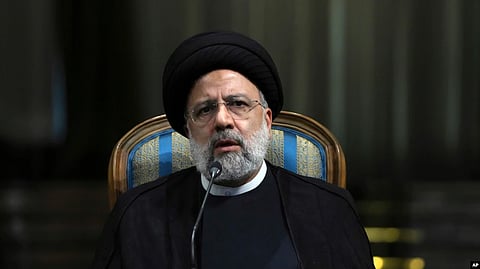The United States said on Wednesday that it has completed its review of a European Union proposal to revive an international agreement to restrain Iran’s nuclear program in exchange for economic sanctions relief. In the convoluted diplomatic path toward possible renewal of the 2015 pact, the U.S. sent its views back to the EU, which in turn forwarded them to the Iranian government, with a spokesman saying they are under review.
"This evening, Iran received the U.S. response through the European Union. The careful review of the response has started in Tehran," Iranian Foreign Ministry spokesman Nasser Kanani said. "Iran will share its view with the EU, as the coordinator of the nuclear talks, upon completion of Tehran's review."
The U.S. is an indirect participant in the negotiations. In 2018, then-President Donald Trump withdrew from the international treaty agreed to by his predecessor, Barack Obama. The U.S. has been studying the EU-drafted document that emerged from months of negotiations. A senior Biden administration official said that while the parties are closer to an agreement than they were two weeks ago, “some gaps remain.”
The official said the EU proposal does not include Iran’s demand that the United States remove Iran’s Revolutionary Guard Corps from a list of designated terrorist organizations, nor a demand that the International Atomic Energy Agency (IAEA) close an investigation into traces of uranium found at three undeclared sites. U.S. and Iranian delegations at the negotiations in Vienna have engaged indirectly, with the other parties to the deal acting as intermediaries. Seyed Mohammad Marandi, one of Iran’s advisers to the talks, tweeted Tuesday that removing the IRGC’s terrorist designation was never an Iranian demand, and that Iran will not agree to a deal before the IAEA “closes the false accusations file.”
Iran and a group that includes the United States, Britain, China, France, Germany and Russia agreed in 2015 to implement the Joint Comprehensive Plan of Action, giving Iran relief from sanctions that strangled its key oil exports. The aim from the international side was to ensure Iran could not develop nuclear weapons. Trump withdrew from the deal he had long criticized as too friendly to Iran and added fresh sanctions on Iran. The Iranians responded by taking incremental steps away from their commitments under the nuclear deal, including enriching uranium to higher levels, holding larger stockpiles of enriched uranium and deploying more advanced centrifuges at nuclear facilities. U.S. President Joe Biden came into office pledging to revive the deal, which was signed while he served as vice president under Obama.


